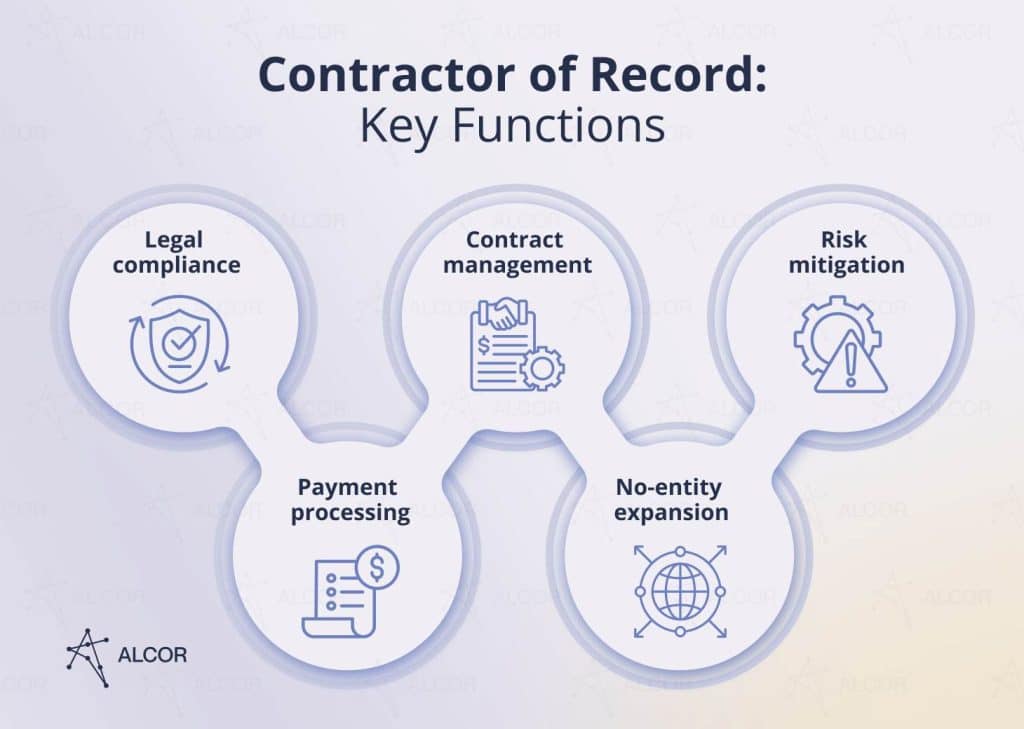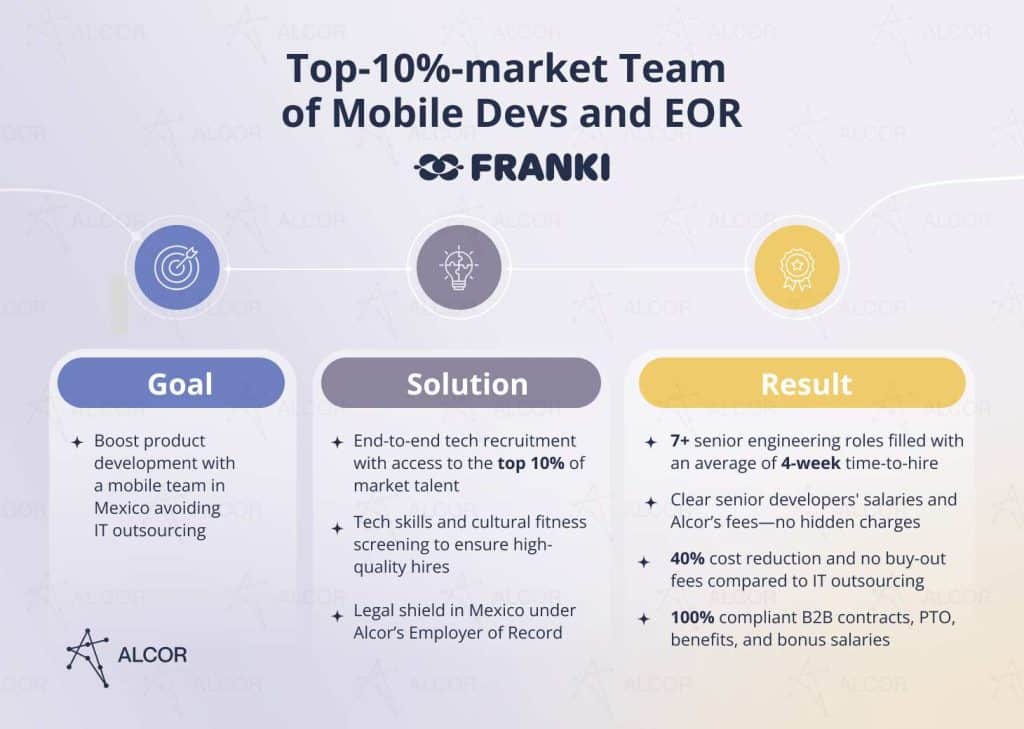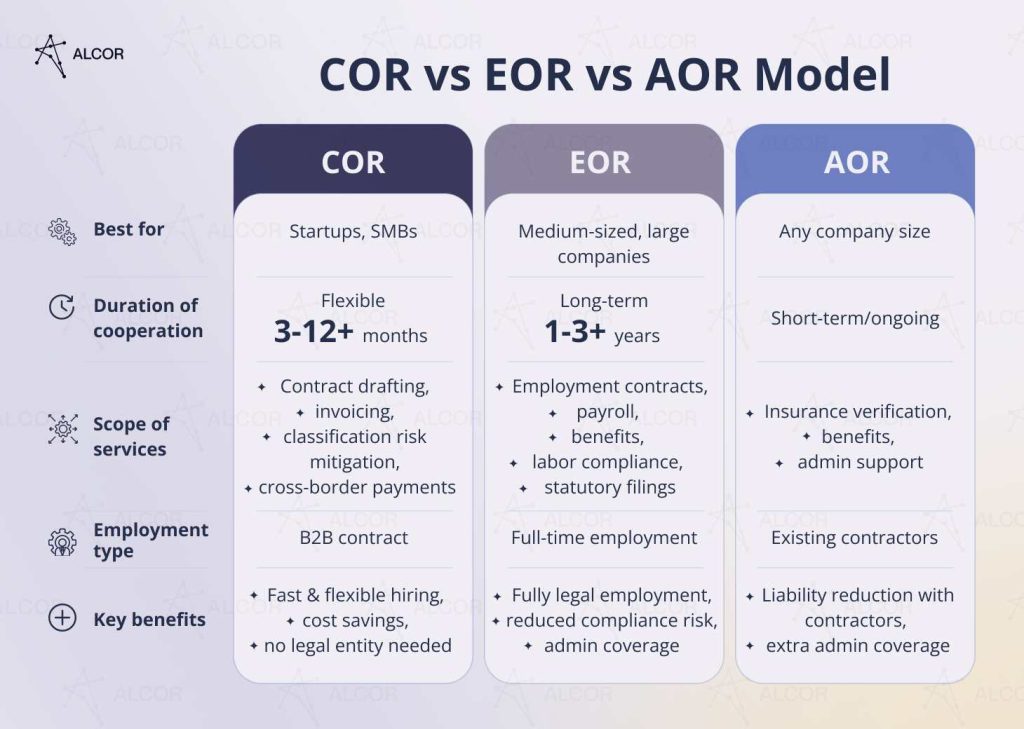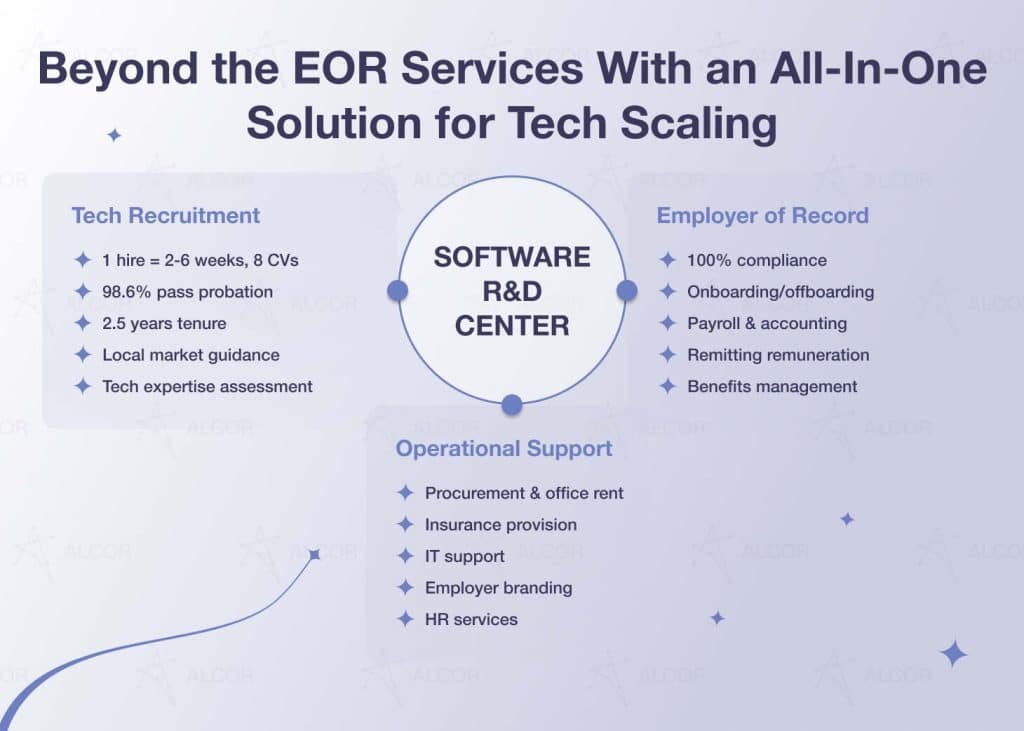Contractor of Record (COR) is a third-party company that legally hires and manages independent contractors on behalf of expanding tech businesses. With cross-border hiring and mobility on the rise, 47% of tech executives are already engaging skilled contract talent to overcome the developer shortage. And that’s what drives COR services to gain traction.
But is this COR game worth the candle for your innovative company?
I’m Oleh Danylchenko, Head of Legal at Alcor. We help tech companies hire developers 100% compliantly and entity-free by building tech R&D centers. We combine COR/Employer of Record in Latin America & Eastern Europe, recruitment, and ops support to scale teams from 10 to 100 elite developers within a year.
In this article, you’ll explore the main functions and benefits of the Contractor of Record model, how COR mitigates risks and secures ROI. You’ll also discover alternative models to choose the optimal one for your tech business.
Key Takeaways
- The Contractor of Record serves as a bridge for tech companies, enabling them to expand without legal complications. They manage compliance, contracts, payments, and admin tasks, ensuring smooth global hiring.
- Contractor of Record enables tech companies to tap into vast talent pools in LATAM and Eastern Europe, reduce expenses by 60%, and mitigate legal and classification risks.
- COR agreements clearly define the roles and responsibilities of involved parties, the scope of services, IP rights, and payment terms to ensure transparent collaboration.
- Unlike EORs and AORs, CORs specialize in managing independent contractors, offering high flexibility and lower costs for expanding tech companies.
- Alcor’s R&D center is an upgraded version of COR, which also includes tech recruitment and full operational support, helping tech companies build compliant and scalable development teams in LATAM and Eastern Europe.
Contractor of Record: Key Functions
Global expansion
Looking beyond borders? A Contractor of Record solution is your golden ticket to international hiring. Backed by local expertise and on-the-ground presence in multiple markets, COR frees you from red tape, legal guesswork, and costly delays.
For instance, Alcor’s Contractor of Record services enable tech companies to access cost-effective tech locations in Latin America and Eastern Europe, where they can build high-performing development teams in just one month.
Legal compliance
Navigating laws and regulations across borders is not a walk in the park. From strict data protection rules in Chile to labor termination rules in Colombia, you need to dig deep into each location of your expansion to ensure full compliance.
Luckily, there are COR providers who ensure contractor engagements align with local tax, employment, and commercial regulations, so you stay legally clean while expanding rapidly in the new market.

Contract management
One-size-fits-all contracts don’t cut it when hiring globally. Each country has its labor law peculiarities, which are especially strict in pro-worker locations like Mexico. Here, if a contractor works under direct supervision or lacks financial independence, they can be reclassified as an employee by local authorities. That means you could be liable for back pay and penalties.
A COR service provider protects you from misclassification. They draft and localize contracts that meet regional legal standards, clearly outline project-based deliverables, and avoid red flags like fixed working hours or direct supervision.
Risk mitigation
Hiring contractors abroad carries significant legal and financial risks, especially when it comes to worker classification, taxes, and local compliance requirements. That’s where a Contractor of Record steps in, making sure every engagement is compliant from day one.
At Alcor, we help tech companies avoid costly penalties by drafting compliant contracts and staying up-to-date with evolving labor regulations across LATAM and Eastern Europe. Just ask BigCommerce. To help them expand into EE without legal risks, our lawyers developed a tailored solution that ensured full GDPR compliance, addressing any potential concerns from European authorities. With Alcor, you can scale globally without getting stuck in legal quicksand.
Payment processing
Paying international contractors isn’t just about clicking a button “Send.” It involves navigating local tax systems, currency exchange rates, banking regulations, and invoice tracking. One wrong move and you can face penalties or delays.
A Contractor of Record company streamlines the entire payment process, ensuring timely, accurate, and compliant payments in local currencies while taking care of withholding obligations, documentation, and contractor invoicing.
Why Use Contractor of Record in 2025?
1. Fast access to tech talent
Are you one of those 76% tech C-suite managers who struggle to hire skilled software engineers? With COR – not anymore! By cooperating with a Contractor of Record provider, you can tap into a 2-million-talent pool in Latin America and a 1.8-million-talent pool in Eastern Europe, faster than your competitors! Plus, you can hire them without the need to establish a legal entity, scaling your team up or down as needed.
Look at how Franki, a California-based tech company, took advantage of this opportunity with Alcor’s COR service in Mexico. With an average time-to-hire of just 4 weeks, we recruited 7 senior Mobile Developers, ensuring full compliance with Mexico’s laws and managing B2B hiring and benefits. On top of a fully backed dev team, Franki was able to save 3.5 months on opening a legal entity and expand within their budget.

2. Slashed expenses
With the Contractor of Record model, you can save up to 60% on salary expenses. Hard to believe it? The figures don’t lie!
While the average software engineer in the US earns $130,750 per year, in-demand roles like AI, Cloud, and Cybersecurity can command salaries of up to $168,000. LATAM and Eastern Europe offer a more budget-friendly alternative. The developers’ average salaries reach only $52,300 and $57,750, respectively.
And here’s the real win: by hiring through B2B contracts, you don’t need to worry about covering taxes – contractors handle that themselves.
3. Full compliance
Hiring global contractors sounds easy until you face a maze of local labor laws and tax regulations, predominantly connected to business incorporation and contract agreements. Each country has its own rules, and keeping up is a serious drain on your time and resources. Failure to comply with them can lead to hefty fines and even legal action.
A Contractor of Record takes this burden off your shoulders by handling compliance across various jurisdictions, contract management, and tax documentation. With Alcor, you can also tailor B2B contracts to your tech business needs and get IP rights and NDA agreements. You stay focused on building innovative tech products while your COR partner keeps you on the right side of the law.
4. Shield from worker misclassification
COR service providers help tech companies, like yours, legally engage contractors abroad, protecting you from regulatory scrutiny and financial liabilities tied to improper worker classification.
At Alcor, we prevent misclassification through result-driven contracts, clear contractor accountability for service quality, and strict invoicing standards. Our contractors register with tax authorities and manage their own tax obligations, ensuring full compliance with commercial laws across LATAM and Eastern Europe.
5. No admin burden
Did you know that one-third of companies spend at least 11 hours a week on HR admin, costing them nearly $350K annually? Now, imagine having to do it in another country. Additional staff, training, and increased labor expenses are just a few factors your company will incur to manage administrative functions for your remote contractors.
Contractor of Record handles all admin tasks for you, from contractor onboarding and offboarding to payments, benefits, and HR, so that you can focus on product strategy and growth.
Contractor of Record Legal Agreement Aspects
Now, let’s take a closer look at the COR agreement. It lays the legal and operational ground for cooperation with both your contractors and the vendor abroad. Below are the key elements every solid COR agreement should cover:
Parties involved
A COR agreement lays out the responsibilities and expectations of all parties involved to minimize inconsistencies and risks.
- Client company: Manages the contractor’s day-to-day work, assigns tasks, monitors performance, and approves deliverables.
- Contractor of Record: Drafts compliant contracts, manages invoices, ensures tax filings, monitors legal changes in the contractor’s location, and handles onboarding/offboarding.
- Independent contractor: Completes assigned tasks and projects under the terms defined in the agreement, submits invoices, and complies with local tax laws.
Scope of services
Defines what the Contractor of Record and independent contractor are expected to deliver, how, and by when. It sets the foundation for the working relationship, aligns expectations, and protects all parties. Let’s say you’re hiring a developer in Mexico to work on your mobile app. Here is a brief scope of services:
A contractor should deliver frontend development services, with weekly demo updates and final delivery in 6 months.
Contractor of Record will handle all onboarding documents, ensure B2B compliance under Mexican law, and process monthly invoices for the contractor.
Legal employment status
It’s essential to clearly define in your agreement that Contractor of Record is the legal engager, not a legal employer, who formally contracts with the independent contractor on behalf of the client, while ensuring compliance with local laws, such as tax reporting, invoicing, or work classification rules.
Payment terms
Payment terms define how, when, and in what currency contractors will be paid – and how the COR facilitates these transactions on your behalf. Unlike traditional employment, independent contractors are usually paid per task/project, by the hour, or on a monthly basis, often in US dollars. Common payment methods include Wise, Payoneer, or SWIFT transfer, all managed by the vendor. A COR agreement outlines this structure clearly and ensures both parties are aligned.
Compliance & risk mitigation
Since labor laws, tax rules, and compliance requirements vary significantly across countries, a reliable Contractor of Record ensures that every engagement adheres to local regulations precisely. This includes proper classification of independent contractors, mandatory registrations, and ensuring that contractors issue valid invoices.
IP & data protection
Protecting your tech company’s intellectual property is a top priority in any COR agreement. The contract should clearly state that all IP created by the contractor during the engagement belongs to the client, preventing any future ownership disputes. This includes software code, designs, inventions, and any other work products.
Termination
Termination clauses are a critical part of any COR agreement. Why? Because they define the conditions and terms, the contract can be ended. They usually include notice periods, grounds for termination, and any obligations that follow termination, such as final payments or the return of company assets.
Unlike traditional employment, contractor agreements are usually more flexible. For instance, a client may terminate a contract with 15 or 30 days’ notice, depending on local laws and terms outlined in the agreement.
How COR Mitigates Risks and Secures ROI
A reliable Contractor of Record doesn’t just help you hire; they help you hire safely. Here’s how:
- Local compliance assurance: CORs stay up to date with regional labor laws, ensuring every contractor agreement complies with local standards, reducing the risk of audits, penalties, or regulatory scrutiny.
- Worker classification protection: By structuring results-based contracts and overseeing proper invoicing and taxation, a Contractor of Record protects your business from misclassification fines and retroactive liabilities.
- Contractual clarity: Contractors of Record draft agreements that clearly define IP rights, termination terms, and deliverables, helping prevent disputes and protecting your assets.
- Streamlined admin & payments: With a COR managing onboarding, payroll, and documentation, you avoid errors or oversights that could trigger legal or financial trouble down the line.
- Ongoing monitoring & support: Your COR provider doesn’t vanish after onboarding. They continuously monitor compliance and provide support for any issues that arise throughout the partnership, acting as a steady co-pilot in your global hiring journey.
But how does it work in practice? Look at the case with Gotransverse. This US-based software product company was seeking ways to hire full-stack developers in Eastern Europe without establishing a legal entity. Through Alcor’s COR combined with R&D center services, they secured:
- A senior full-stack team in just 6 weeks
- Full compliance with EU and US legislation
- Direct team management from day one
- Payments and tax management for developers
- Equipment procurement & dedicated support
With their newly assembled full-stack team, Gotransverse successfully launched a major software update, boosting their client base and revenue. That’s how smart tech companies reduce risk and maximize return when expanding globally.
Alcor also acts as an Employer of Record service provider in Poland and other EE and LATAM countries. Reach out to learn more!
COR vs EOR vs AOR: Breakdown with Examples
Here is a quick peek into the models:
COR: Enables legal engagement of independent contractors abroad for tech companies.
EOR: Acts as a legal employer of full‑time developers on behalf of the client, taking on full liability for employment as well as handling compliance, payroll, and benefits.
AOR: Acts on behalf of their clients when dealing with insurance or employee benefits through third parties, without covering hiring or administrative functions.
Now, let’s dive into details…
Employer of Record is a hassle-free approach for employing foreign software developers without the need for business incorporation. Basically, you use the existing legal entity of your EOR provider to build a development team while also enjoying their full liability. Unlike CORs, Employer of Record offers a wider range of compliance and admin services, which makes them a bit more expensive.
Discover the differences between EOR vs PEO!
Agent of Record is a supplementary service to your existing COR or a helping hand for your internal ops team. They help you deal with insurance negotiations, policy changes, and employee benefits through third parties. Unlike the Contractors of Record provider, AOR doesn’t hire developers.

When to opt for Contractor of Record
COR is ideal for startups and companies that are aggressively expanding, particularly those working on cutting-edge innovations, such as AI, blockchain, robotics, and SaaS. These businesses often face skill gaps when building agile teams, so Contractor of Record can easily bridge this issue by legally and swiftly engaging independent contractors with niche skills.
When to opt for Employer of Record
Global Employer of Record services are best suited for mid-sized to large tech companies planning long-term engagements with full-time international employees, especially when IP ownership and team retention are key considerations. It is ideal for product companies, fintechs, and enterprise software businesses that want to enter new markets without establishing a legal entity.
Expanding to LATAM? Check out Employer of Record services in Colombia!
When to opt for Agent of Record
AOR works well for tech companies and staffing agencies that lack internal expertise to manage employee benefits, insurance, and some admin functions. It’s a smart option for short-term, project-based work where you already source tech talent but need a partner to handle paperwork.
Top 3 Industries Using Contractor of Record for Global Expansion
I’ve already touched on the companies that could potentially benefit from Contractor of Record. Now, let’s take a broader view by examining the industries. While COR can support any, there are several standout examples:
Retail & e-commerce
With the rise of global online shopping, many e-commerce companies scale across borders to stay competitive. Sales managers, customer service support, data analysts, and UI/UX designers are hot positions these businesses are hiring for. The Contractor of Record model allows them to engage these professionals quickly, especially in time zones aligned with the US, without committing to permanent employment or entity formation.
Gaming & entertainment
Gaming studios and startups always work on new and exciting products. Engaging niche game developers (sometimes even indie game developers), illustrators, 3D artists, and sound engineers on a freelance or contract basis is not rare. The Contractor of Record model allows them to quickly tap into global talent to address skill gaps and launch seasonal releases without the commitment of long-term employment.
Technology & ICT
Probably the most vibrant and versatile industry that needs Contractor of Record assistance to stay ahead of the innovation curve. From early-stage AI startups to growing SaaS companies, leveraging COR helps innovation businesses hire developers of any type and expertise level without the burden of compliance and admin. With tech expenses soaring and talent shortage looming, many hi-tech companies turn to LATAM and Eastern Europe for skilled, cost-effective developers that they can legally onboard in weeks, not months.
This is what Alcor makes possible. See yourself…
Alcor – COR and EOR provider in Latin America and Eastern Europe
Why settle for just the Contractor of Record model when you can get recruitment and all operational support in one place, without juggling multiple providers? That’s what we thought when we were devising our all-in-one R&D center solution.
You get:
– COR & EOR for tech: Skip the red tape and save up to 3.5 months on business incorporation by using Alcor’s local legal entities in LATAM and Eastern Europe. Hire developers on FTE or B2B terms without the legal hassle. Plus, we also cover legal compliance, contract management, developer on/offboarding, payroll, and benefits.
Learn more about the intricacies of IT EOR in Poland – how it handles local taxes, and provides you with a 100% legal shield and GDPR compliance!
– A to Z recruitment: Our 40 tech recruiters handle all aspects of hiring to find the best-fitting software engineers in 2-6 weeks. With 98.6% of our hires successfully passing probation and staying with our clients for an average of 2.5 years, you can be sure of the high quality of our tech talent.
– Operational support: If you need something extra like an office or coworking space, hardware, or employer branding, we’ve got your back! Plus, our Customer Success Managers are available to assist you 24/7.

Our R&D center solution has already proved effective for BigCommerce, Ledger, People.ai, and other US and Western European tech companies. In fact, 93% of tech CEOs and CTOs we’ve worked with say they’re satisfied with our services.
Try it out yourself! Fill the form below and let’s discuss your expansion needs.
